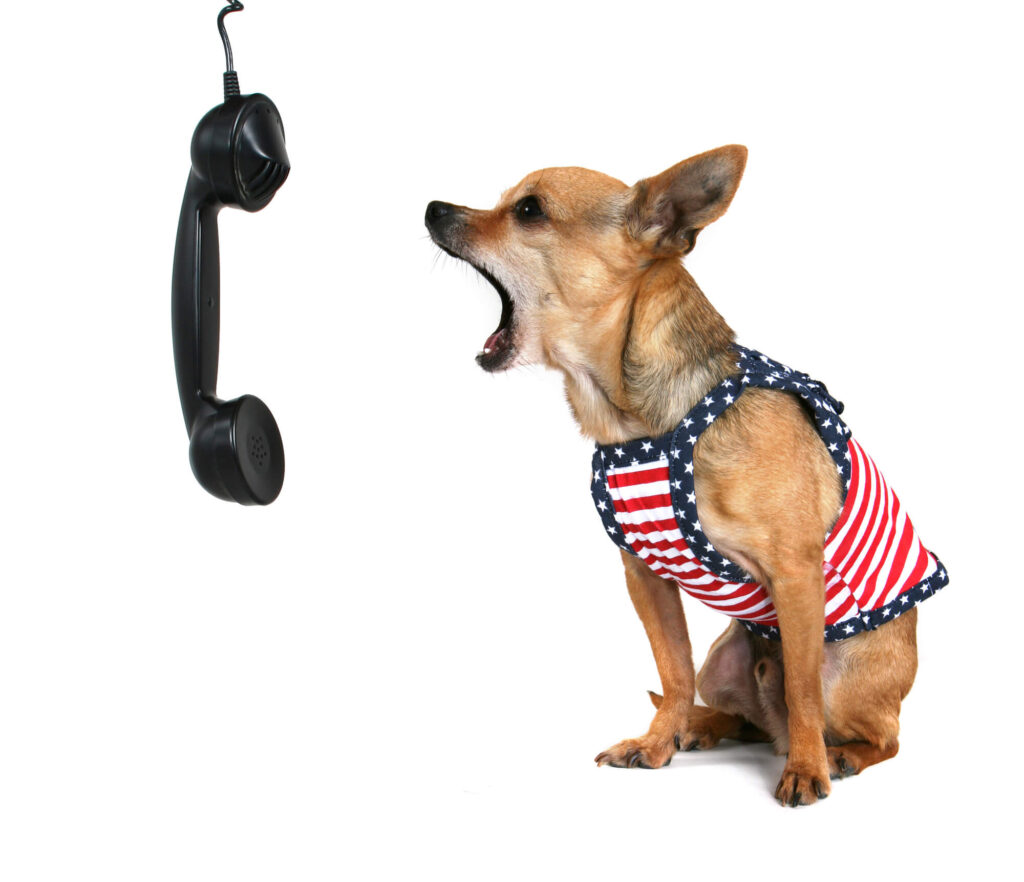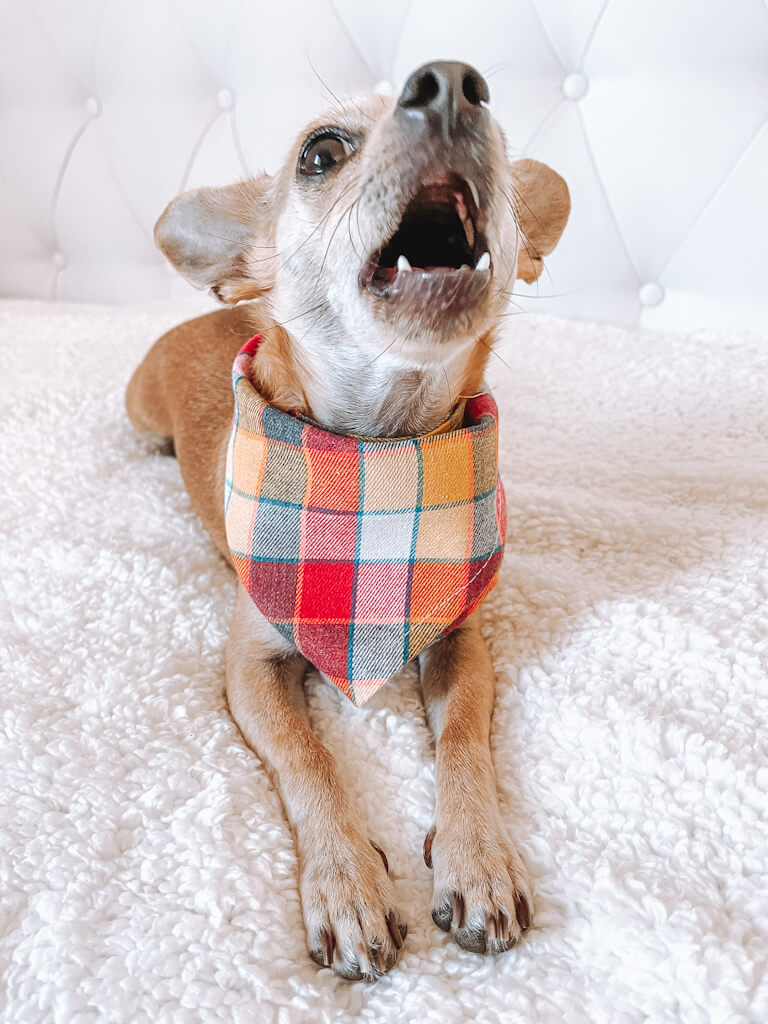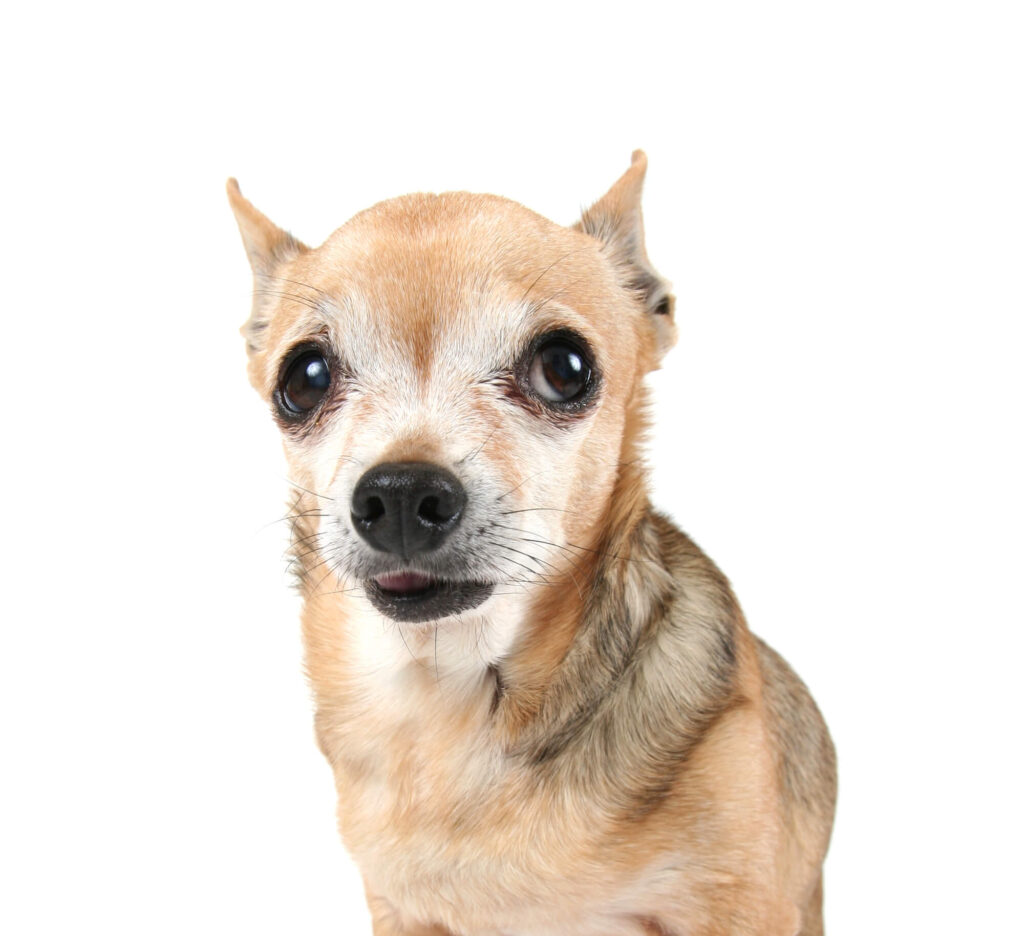Why Do Chihuahuas Bark So Much? (+ 12 Tips)
Why do Chihuahuas bark so much?
It’s a question that many dog owners have asked themselves, especially those who have a Chihuahua at home.
Our Chihuahua, Leo, is notorious for being a guard dog with a bark that can rival even the loudest of alarms.
But behind their tiny frames and big personalities, there’s a lot more to Chihuahuas’ excessive barking than meets the ear.
Are they just naturally vocal dogs or is there something else going on here?
Let’s take a closer look at all the reasons Chihuahuas bark so much and effective training tips on how to reduce your Chihuahua’s barking.

Do Chihuahuas Bark A Lot?
Yes, Chihuahuas bark a lot, but dogs are also individuals so it depends on their background, training, and personality.
Generally speaking, most Chihuahuas are vocal dogs who are prone to barking loud.
Do all Chihuahuas bark a lot? Some Chihuahuas bark at every little thing while others are comparatively quieter, either due to their innate nature or effective training.
Their small size can make the world seem intimidating, so they often feel the need to alert their guardians to every little thing.
11 Reasons Why Chihuahuas Bark So Much
1. Territorial & Protective
Chihuahuas are territorial companion dogs, and their barking is a way of defending their territory from perceived danger.
Their territory can be anything from their home, yard, crate, or even you!
Since Chihuahuas are clingy and super protective of their people, they bark to protect them from danger.
Chihuahuas see their family as their pack and they will bark to alert you to a strange noise, an animal outside, or an unfamiliar person approaching.
Chihuahuas make good guard dogs and barking is part of their job.
2. Boredom and Excess Energy
Another reason why Chihuahuas bark so much is that they are very high-energy dogs and can get bored easily.
Barking is one way of releasing excess energy, especially if they are bored, frustrated, or haven’t had enough exercise.
For example, if a Chihuahua is left home alone for too long, they may start barking out of boredom.
This can lead to other undesirable behaviors like tipping over their water bowl, chewing on furniture, or excessive digging.
Providing them with 30 minutes of exercise a day can help prevent boredom.
Here are 24 fun games you can try out with your Chihuahua to keep them entertained!
3. Excitement
Chihuahuas are very excitable dogs, and their barking is often a way of expressing their excitement.
They bark when you come home from work because they are excited to see you.
They might even headbutt you or lick inside your nose to show you some extra love!
When we ask our Chihuahua if he wants to go for a car ride or a walk, he gets so excited that he can’t stop himself from barking and spinning around! Who could blame him for that?
4. Attention and Communication

Chihuahuas love attention and are labeled as Velcro dogs, so they will bark until they get the attention they crave.
They may start barking to try to get some belly rubs, or quality playtime, or they may just want to sit on your lap.
Dogs use barking to communicate their needs, whether that be treats, food, attention, etc.
Think of barking as a dog’s way of talking!
For instance, they might bark by the door when they want to go outside or bark when they’re hungry or want to play.
Chihuahuas are pretty smart dogs, and they know that barking can get them what they want.
5. Fear

Why do Chihuahuas bark at everything? Many Chihuahuas bark at objects, people, or noises because they are scared or unsure.
They could be scared of thunder, fireworks, brooms, a stranger, or a large dog.
Chihuahuas are known for being afraid of many things because of their tiny size, and their barking is often a way of expressing that fear and their attempt to protect themselves.
Our Chihuahua has barked at a traffic cone, a garbage bag on the sidewalk, and even a flag flapping in the wind!
Read more: 12 Surprising Reasons Why Dogs are Scared of Brooms
6. Separation Anxiety
Why do Chihuahuas bark a lot when left alone?
Separation anxiety is when a dog becomes anxious and stressed when they are away from their owner. This causes dogs to bark and howl the second they find themselves alone.
Chihuahuas are known for being needy and attached to their owners, so it’s not surprising that they may suffer from separation anxiety.
Other signs of separation anxiety are indoor accidents, pacing, tipping over their water bowl, chewing, and digging.
7. Aggression

Some Chihuahuas bark out of aggression.
This is usually towards other dogs or people, but it can be directed at anything.
For example, if a Chihuahua is resource guarding, they may bark and growl to try to keep others away from their food, toys, or anything else that they consider to be theirs.
This type of barking should not be ignored, as it can lead to biting or other aggressive behaviors.
8. Playing
Do Chihuahuas bark a lot when playing? Yes, some Chihuahuas are very vocal when playing, and their barking is just part of the fun.
This is usually seen in younger dogs who are still learning how to play appropriately.
As they get older, they typically learn to tone down their barking when playing.
9. Pain
Dogs may also bark out of pain. This can be due to an injury, illness, or any other type of discomfort.
If your dog injures themself, they may let out a yelp or cry and then start barking. This is their way of telling you that something is wrong and they need help.
If your Chihuahua is barking and seems to be in pain, it’s best to take them to the vet to get checked out.
10. Canine Dementia
Older dogs may start barking more due to canine dementia.
Canine dementia is a condition that causes changes in the brain that can lead to changes in behavior.
Dogs with canine dementia may start barking excessively for no apparent reason and may seem confused or disoriented.
They may not recognize their owners or other familiar people and places.
11. Dreaming
Some Chihuahuas bark in their sleep because they are dreaming.
This is usually a soft, quiet bark that doesn’t last very long.
It’s normal for dogs to bark in their sleep during the REM stage of sleep.
Small dogs like Chihuahuas switch between non-REM and REM sleep more often than larger dogs, which leads to more dreaming and more sleep barking.
They may also twitch, act like they’re running, or flutter their eyes.
Normal Barking vs Excessive Barking
While barking is a natural behavior, excessive barking can be a problem.
It’s important to understand the difference between normal barking and excessive barking so that you can address the root of the problem.
Here are some examples of normal barking vs excessive barking:
| Normal Barking | Excessive Barking |
| Barking when someone comes to the door | Barking for hours on end |
| Barking during playtime | Barking at every little noise |
| Barking when they need to go outside | Barking when left alone for long periods of time |
| Barking to greet you | Barking at other dogs or people or objects like cars or vacuums |
12 Effective Ways to Train A Chihuahua Not to Bark
If you’re thinking, “my Chihuahua barks at everything,” you’re not alone!
Now that we know why Chihuahuas bark so much, what can be done to reduce their barking?
While you’ll never be able to completely get rid of barking, there are many to reduce it.
Training
1. Teach the Quiet Command
When your Chihuahua starts barking, wait for a brief pause and then say “quiet” in a calm tone. Reward them with a treat and praise for being quiet.
Each time your dog stops barking, praise him and give him a treat.
This will help him learn that being quiet is rewarded and he doesn’t have to bark at every little noise.
Keep a bag of treats near you so you can quickly reward your dog when he hears a noise but stays quiet.
2. Desensitize to Doorbells and Knocking
Most dogs get set off by the doorbell ringing or someone knocking at the door.
To help reduce this type of barking, you can start desensitizing your Chihuahua to the doorbell.
Have someone ring the bell or play the sound from a Youtube video and give a treat.
Your dog will learn that they get a yummy treat when the doorbell rings and they don’t bark.
We always keep a bag or jar of treats right next to the couch so that when we get a delivery or someone rings the doorbell, we are ready.
These are our recommended treats, tested by our Chihuahua, Leo.
You can also teach your dog to go to a certain spot when the doorbell rings like their bed or crate and wait for a reward.
This way, they are not in the way when you answer the door and you won’t risk them running out.
3. Positive Interrupter Cue
An interrupter cue is a special noise or action that you do that interrupts your dog’s barking. This replaces yelling or saying “no” as a way to stop the barking.
This can be something as simple as making a kissing noise or a clicking noise with your tongue.
When your dog starts barking, make your sound and when he looks at you, immediately give him a treat.
Do this enough times and he will start to associate the interrupter cue with getting a treat and eventually, he will stop barking.
4. Have A Plan When Guests Come Over
The best way to stop a Chihuahua from barking at strangers is to have a plan in place before guests come over.
This might mean crating or putting your dog in another room so they can’t run to the door and bark at the person.
Our Chihuahua does well with meeting guests outside first. We have the guest toss some treats at him so he associates them with something positive.
This way, he can smell them and get used to their presence before they come into his territory.
Environment
5. Create Background Noise
For Chihuahuas bothered by apartment or city noises, create background noise to curb barking.
Play a white noise machine, some music, or even just keep the television on to help drown out the other noises.
This will make it harder for your Chi to hear these triggers, leading to reduced barking.
6. Reduce Visual Stimuli
If your Chihuahua can see out of the windows or doors, he may bark at people, dogs, wildlife, or even cars passing by.
One way to reduce this type of barking is by closing your curtains or blinds.
Alternatively, use window cling film to maintain some daylight while decreasing visibility.
Now, passersby won’t be catching your dog’s eye all day and triggering him.
Behavior
7. Don’t Let Dog Bark While Playing
Avoid letting your dog rehearse barking because then they are getting mixed signals about barking inside.
If your dog is barking while playing, stop the game and wait until they’re calm. Reward their silence, then resume playing.
This teaches your dog that barking during playtime is not tolerated.
8. Reduce Leash Reactivity

For dogs who are leash reactive, meaning they bark and lunge at other dogs or people when on a leash, this can be a difficult behavior to change.
It’s best to work with a certified behaviorist or trainer to help you with this but there are some things you can do on your own.
Prevent barking by creating distance between you and the stimulus to block your dog’s view until they’ve passed by.
Change direction, cross the street, or hide behind a tree or parked car.
Try “magnet hand“: hold treats near your dog’s mouth while passing triggers, ensuring they focus only on the treats.
Some great online courses for working on reducing reactivity are Amy Cook’s Management For Reactive Dogs and Spirit Dog’s Tackling Reactivity.
9. Mental Stimulation and Exercise
Combat boredom-induced barking in Chihuahuas by ensuring ample exercise, mental stimulation, and attention.
Allocate at least 30 minutes a day for exercise.
Interactive toys and puzzles will help keep their minds active.
Prioritize quality time together, as they are social creatures. We have a great post on fun games to play with your Chihuahua!
10. Socialization
Insufficient socialization can trigger fear-driven barking in Chihuahuas.
Proper socialization during puppyhood is crucial, introducing them to various positive experiences.
If your Chihuahua isn’t properly socialized, they may bark out of fear when they see new people or animals.
Health
11. Treat Medical Issues
Excessive barking, especially a high-pitched bark, could mean an underlying medical issue.
If your dog is barking because they’re in pain or due to canine dementia, they will need to be treated by a veterinarian.
12. Medication
When dealing with severe anxiety or separation anxiety in Chihuahuas, your veterinarian can prescribe medication to help them relax.
Medication can significantly alleviate anxiety and allow your dog to live a happy life.
Methods to Avoid

These ways primarily use fear as a way to stop your Chihuahua from barking and will not address the underlying causes.
Remember, positive reinforcement is always the best way to train your dog.
Methods to avoid:
- Yelling at your dog: your dog will think you are barking with them and will get your dog more worked up
- Physical punishment: it’s cruel and will make your dog scared and stressed out
- Shock Collar/Bark Collar: these devices create fear, have negative side effects, and don’t address the root cause
- Ignoring the Barking: might seem like a good idea, but it reinforces the barking and lets them rehearse it
- Using a muzzle: used for reactive or aggressive dogs but is not a solution for barking
- Debarking procedure: a painful surgical procedure that is considered inhumane
- Spray Collar/Spray Bottle: the spray is irritating and causes fear and anxiety in dogs
- Saying “No”: it’s hard for dogs to understand, best to reward for good behavior instead of punishing for unwanted behavior

Summary
So, why do Chihuahuas bark so much?
Barking is a way for Chihuahuas to communicate with their humans. They bark for lots of reasons, including excitement, fear, boredom, loneliness, and to get attention.
Chihuahuas are known for their excessive barking, but this behavior can be managed with proper training and care.
When you understand why your Chihuahua is barking, you can work on reducing the barking behavior.
FAQs
Why Do Chihuahuas Bark At Nothing?
Dogs have a sensitive sense of smell and can hear better than us, so it’s not surprising that they sometimes bark at things that we can’t see, hear, or smell.
We might think they are barking at nothing, but really they may be smelling an animal scent in the wind or hearing a sound that we can’t detect.
Why Do Chihuahuas Bark At Strangers And Other Dogs?
Chihuahuas bark at strangers and other dogs due to leash reactivity, fear, excitement, or territorial instincts.
Leash-reactivity is when a leashed dog becomes anxious or excited when they see another dog or person, and they may bark or lunge to scare them away or because they’re frustrated they can’t say hello.
Fear and territorial instincts can trigger barking as a defensive response. A lot of rescue dogs have traumatic pasts, which can cause them to be fearful of people and other animals.
Why Does My Chihuahua Bark in the Middle of the Night?
A few common reasons for barking in the middle of the night include boredom, anxiety, and reacting to noises.
Dogs have excellent hearing, making them alert to outside sounds like a neighbor walking by or another dog barking, especially if windows are open.
Lack of daytime exercise and mental stimulation can also lead to restless nights, prompting barking due to pent-up energy.
Chihuahuas love sleeping with or near their guardians, so if you have your dog sleep in a crate or another room, they may bark and whine because they are anxious and want to sleep closer to you.
Do Small Dogs Bark More Than Big Dogs?
Small dogs, including Chihuahuas, are often known for barking more than larger dogs. This is due to their high energy levels, vigilant nature, and protective instincts. Larger dogs usually have a calmer demeanor.
Related posts:






